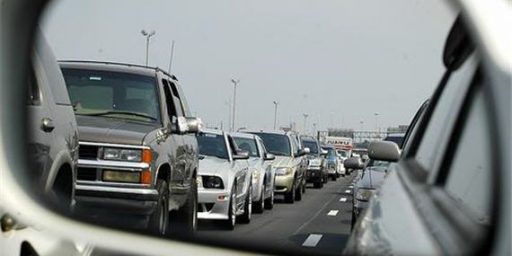Commutes Getting Longer
A scientific panel reports that Americans are commuting further than ever before.
More and more commuters are leaving home earlier, traveling farther and driving alone, says an analysis of commuting trends reported Monday.
The “Commuting in America” study by the Transportation Research Board also found that more commuters are traveling from suburb to suburb — rather than the traditional commute from suburb to city. “As more employers move out of cities to be closer to skilled suburban workers, the suburbs now account for the majority of job destinations,” the report noted.
The board, part of the National Academies, has analyzed commuting trends since 1986, largely using Census data. According to the latest analysis, the number of new solo drivers grew by almost 13 million from 1990 to 2000. The number of workers with commutes lasting more than 60 minutes grew by almost 50 percent over that period. And, compared with the previous decade, more Americans are leaving for work between 5 a.m. and 6:30 a.m.
More than 4 million people now work from home, and a growing number of those over age 55 are doing so, the report said, a trend that is expected to continue.
None of this is particularly surprising, really. Aside from traffic getting worse, it’s much harder than it used to be to live close to where one works. Two-income households virtually ensure that at least one partner is a long way from the office. Further, people change jobs much more frequently than in the past, meaning that even if one lived close to the original job they may suddenly be a longer distance from the current one. And, of course, an increasing number of people in urban areas are willing to mover further and further away from work in order to afford larger houses, be in better school districts, or gain the illusion of greater safety for their family.
UPDATE: Kevin Drum wonders, “Why are more people leaving for work before 6 am? The increase seems to be way out of proportion to the average growth in commuting time, which has risen only four minutes in the past 20 years.”
My guess is that much of it is a response to HOV lanes and flex scheduling. In the DC area, at least, several key arteries become carpool lanes at 6:30 am. Also, many employers allow people to come in and leave early or late so that they’re not having to drive during the height of rush hour.



“…or gain the illusion of greater safety for their family…”
Illusion? A spot of wilfull blindness, I think. Speaking as one living next to one of our ‘Urban Combat Zones’ (formerly known as metropolitan areas).
Don,
Statistically, it’s about a wash. What one gains by moving away from crime and smog one loses because of more automobile fatalities caused by radcially increasing driving distances.
See this old post for a bit more discussion.
I posted this on Kevin’s site, but I leave before 6:00 AM so I can run my standard 8-12 miles/day (I run into work and shower at the office gym) and still be at my desk by 7:30. This allows me to (1) train for marathons (I’m a 2:55 guy), (2) hold a 60+ hour/week job, and (3) leave work before 8:00 PM (something that is relatively uncommon in my profession) so I can spend time with my family.
Probably a good 25% of my coworkers do something similar (get up early enough to exercise before work). This might be a unique job environment, though–we’re all relatively young and competitive high achievers, and being physically unfit (or even being only moderately fit, at least before the age of 50) is tacitly frowned upon.
‘“Why are more people leaving for work before 6 am? ‘
To get to Dunkin Donuts before the lines out the door.
Mr. Joyner,
While technically correct, it brings to mind something like ‘the incidence of death in hospices in the US, compared to the carnage associated with being a citizen of Baghdad, are remarkable similar.’ It may be technically correct, but there seems to be a world of context gone missing.
;^)
The “two people working two different jobs” problem is exacerbated by the supposed improvements gained from moving jobs out of the city center into inner-ring suburbs. (i.e. your spouse’s job might be in an inner-ring suburb on the other side of the city center. And transit is no longer even an option. Oops.)